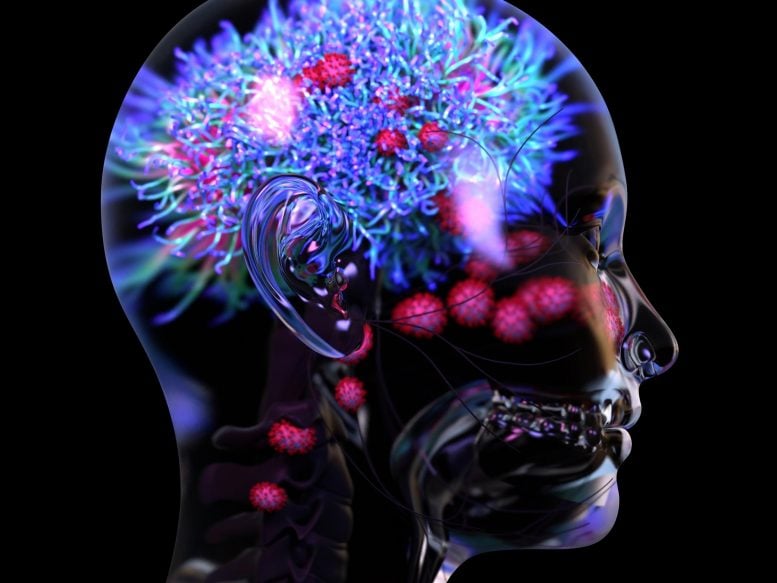
SARS-CoV-2 affects the brain through mechanisms like immune response and neuroinflammation, leading to a spectrum of persistent neurological symptoms known as Long Covid.
Research suggests similarities with chronic diseases like ME/CFS and highlights the need for targeted studies to understand and treat these long-term effects, as advocated by the NIH RECOVER COVID initiative.
Overview of SARS-CoV-2’s Impact on the Brain
SARS-CoV-2 was initially identified as a respiratory virus, but it can affect the entire body, including the nervous system. In a new Viewpoint published in Science, Avindra Nath, M.D., clinical director of the National Institutes of Health’s National Institute of Neurological Disorders and Stroke (NINDS), and Serena Spudich, M.D., Yale School of Medicine, New Haven, Connecticut, highlight what is currently known about the effects of SARS-CoV-2 on the brain, the importance of increased research into the underlying causes of Long Covid and possible ways to treat its symptoms.
Neurological Symptoms and Causes
Neurological symptoms that have been reported with acute COVID-19 include loss of taste and smell, headaches, stroke, delirium, and brain inflammation. There does not seem to be extensive infection of brain cells by the virus, but the neurological effects may be caused by immune activation, neuroinflammation, and damage to brain blood vessels.
Link Between Acute Infection and Long Covid
Acute COVID-19 infection can sometimes lead to long-lasting effects, that have collectively been termed “Long Covid,” and can include a wide variety of symptoms in the brain and nervous system that range from a loss of taste and smell, impaired concentration, fatigue, pain, sleep disorders, autonomic disorders and/or headache to psychological effects such as depression or psychosis.
Drs. Nath and Spudich outline the current scientific understanding of the potential body responses to acute COVID-19 infection and how those responses could lead to Long Covid symptoms. They also draw parallels between the symptoms experienced by individuals with Long Covid to those living with myalgic encephalomyelitis/chronic fatigue syndrome (ME/CFS) or post-Lyme disease, which suggests there could be common risk factors involved.
Research Needs and Future Directions
Finally, owing to the significant variability in symptoms from person to person and the fact that many individuals with Long Covid were healthy prior to a relatively mild COVID-19 infection, the authors highlight the urgent need for significant research efforts to identify the full extent of Long Covid complications and their causes. This kind of research, which would include the careful study of individuals with Long Covid categorized by their specific symptoms, is crucial to the development of diagnostic and therapeutic tools to identify and treat what is becoming an ever-increasing public health concern. The NIH RECOVER COVID initiative is an ambitious research program to reach these goals.
Reference: “Nervous system consequences of COVID-19” by Serena Spudich and Avindra Nath, 20 January 2022, Science.
DOI: 10.1126/science.abm2052
NINDS is the nation’s leading funder of research on the brain and nervous system. The mission of NINDS is to seek fundamental knowledge about the brain and nervous system and to use that knowledge to reduce the burden of neurological disease.
About the National Institutes of Health (NIH): NIH, the nation’s medical research agency, includes 27 Institutes and Centers and is a component of the U.S. Department of Health and Human Services. NIH is the primary federal agency conducting and supporting basic, clinical, and translational medical research, and is investigating the causes, treatments, and cures for both common and rare diseases.